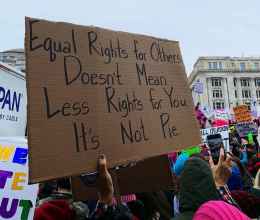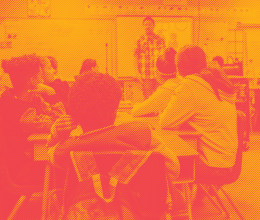Each year, on the fourth Thursday of November, Americans gather together with neighbors, family and friends to share food and gratitude in remembrance of the “first Thanksgiving” some 400 years ago.
As divisive rhetoric from the Trump administration works to drive apart our communities and threatens to exhaust us, the benefit of taking time to think on the things that we have to be grateful for is clear.
But for some of us, Thanksgiving is less a day of celebration and instead serves as a painful reminder of things and people that have been lost.
For Native American communities, the Thanksgiving myth can serve as a particularly visible reminder of the many ways in which Indigenous peoples and their stories have been removed from the American story – whether through genocide or revisionist storytelling.
The Thanksgiving story popularized in elementary school pageants (and almost every other medium you can imagine) of how the Indians and Pilgrims became fast friends over a shared meal is both inaccurate and harmful.
It’s a story that’s not unique to the Wampanoag people, but one that unfolded in Native communities across the continent as white settlers decimated Indigenous communities and forced them from their land. It is a story that is still very present here in Maine, left in the memories and trauma of the Native individuals in our communities that were taken from their homes as children and placed in white homes and schools in an attempt to erase their Native culture.
In the words of Wamsutta, a Wampanoag man whose ancestors were among those present at the first Thanksgiving, “history wants us to believe that the Indian was a savage, illiterate, uncivilized animal…Let us remember, the Indian is and was just as human as the white man. The Indian feels pain, gets hurt, and becomes defensive, has dreams, bears tragedy and failure, suffers from loneliness, needs to cry as well as laugh. He, too, is often misunderstood.”
So, this Thursday we ought to take time to remember what our Native communities have lost and to pause and listen to what they have to say.
We’ve come a long way since the first Thanksgiving, and that is something to be grateful for. But we must remember there is much work left to be done and recommit ourselves to the fight ahead.
For more information on the National Day of Mourning, visit the United American Indians of New England website.




